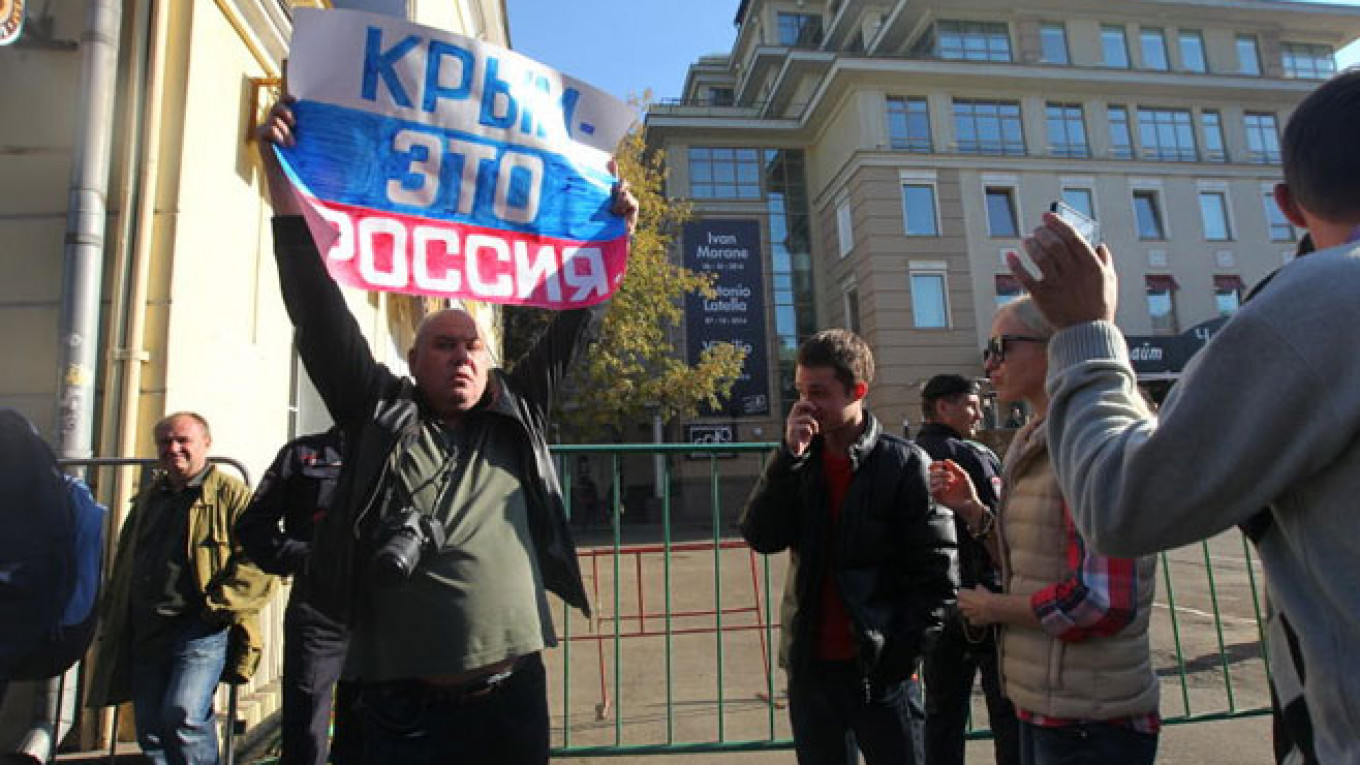In his speech at last month's annual Valdai Club meeting, President Vladimir Putin accused the West of "double standards" in Ukraine. This is nothing new. Putin has habitually spoken of the West's double standards since he first came to power.
Those wishing to understand Putin's linguistic gymnastics should look up "whataboutism." The term emerged at the height of the Cold War and described a favorite tactic of Soviet propagandists — the tendency to deflect any criticism of the Soviet Union by saying "what about" a different situation or problem in the West. As Putin's language suggests, the practice is alive and well in today's Russia.
Whataboutism is a way of shutting down discussion, discouraging critical thinking, and opposing open debate. It is a key feature of Russian politics these days. And it is central to Russia's unconventional war on Ukraine, in which Moscow manipulates facts and spouts lies in an effort to soften public opinion and influence Western policy.
For those struggling to combat Putin's propaganda, it may be time to use the Russian strongman's own language against him. And there are few better ways to do this than by comparing the Kremlin's contrasting approaches to Crimea and Chechnya.
Listening to Putin speak about Crimea one could almost get the impression that he supports separatist sentiments. That is until one recalls that he went to war in 1999 to stem similar separatist sentiments in Chechnya. Similarly, Putin supported the right of self-determination in Crimea, but has consistently denied the same right to Chechens. Again, Putin sent Russian troops to Crimea to ensure that the peninsula's referendum took place and quickly recognized the results, but has never recognized the right of Chechens to hold a referendum.
In short, separatism, self-determination and referenda are fine except when Putin decides that they are not.
Putin has argued that any solution to the Ukraine crisis should involve a process of federalization, but he has done everything in his power to recentralize the Russian state. Putin has accused the Ukrainian authorities of committing war crimes in eastern Ukraine, but he failed to prosecute, and in some cases, promoted and rewarded, individuals accused of war crimes in Chechnya. Putin has encouraged Kiev to negotiate with the pro-Russian separatists in eastern Ukraine, but he resolutely refused to negotiate with the Chechen separatist leadership.
Of course, double standards are part of every government's playbook. But those double standards become particularly troublesome when a country treats foreign citizens better than its own and extends rights to foreign territories that it denies to its own.
Crimea is not Chechnya. Or at least, not yet. Since Russia's annexation of Crimea, Putin has begun importing his brand of authoritarian rule to the peninsula. Crimea's new Kremlin-backed authorities have cracked down on critical journalists, restricted public gatherings, and launched raids on businesses. It appears that Moscow's Chechen policy — of co-opting a local warlord into power, employed so successfully with the Kadyrov family — is being rolled out in Crimea.
Confronted with his own double standards, Putin faces a painful paradox. Russia's folly in Ukraine was initially justified by the Kremlin as a response to alleged persecution in Ukraine, but it is Russia that now persecutes individuals in Crimea, particularly the peninsula's Muslim Tatar population.
If Putin were serious about the protecting the rights of Russian citizens and Russian speakers, he would reform Russia. After all, it is in Russia where Russians are exposed to a grotesquely corrupt, illiberal system that constrains democracy, curtails media freedoms, reins in the judiciary, restricts civil liberties, and treads on human rights.
Andrew Foxall is director of the Russia Studies Center at The Henry Jackson Society, a London-based international affairs think tank.
A Message from The Moscow Times:
Dear readers,
We are facing unprecedented challenges. Russia's Prosecutor General's Office has designated The Moscow Times as an "undesirable" organization, criminalizing our work and putting our staff at risk of prosecution. This follows our earlier unjust labeling as a "foreign agent."
These actions are direct attempts to silence independent journalism in Russia. The authorities claim our work "discredits the decisions of the Russian leadership." We see things differently: we strive to provide accurate, unbiased reporting on Russia.
We, the journalists of The Moscow Times, refuse to be silenced. But to continue our work, we need your help.
Your support, no matter how small, makes a world of difference. If you can, please support us monthly starting from just $2. It's quick to set up, and every contribution makes a significant impact.
By supporting The Moscow Times, you're defending open, independent journalism in the face of repression. Thank you for standing with us.
Remind me later.


